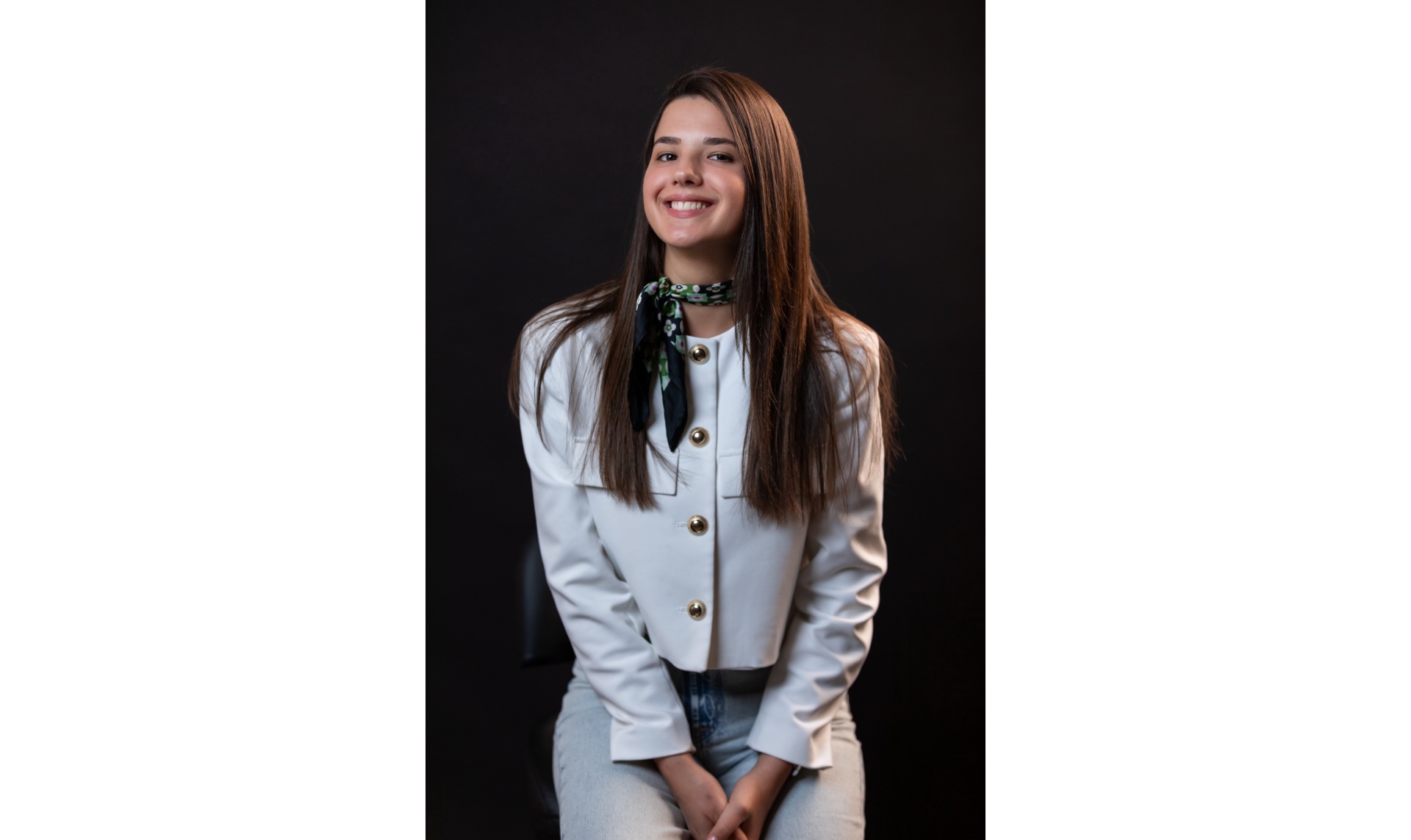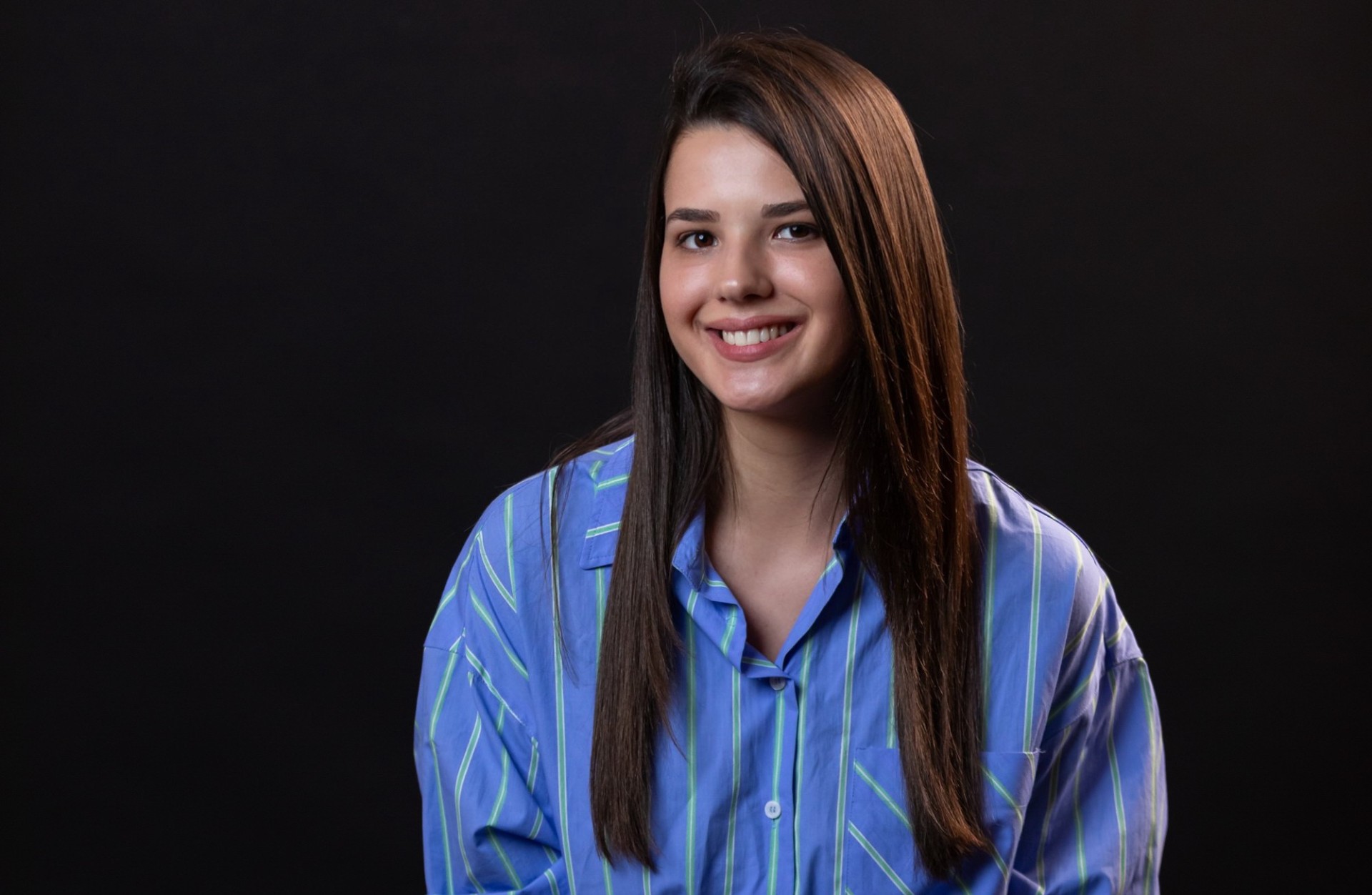Interview with Jelena Kavarić
– project manager at NGO “Center for Youth Education” –
We discussed the significance of informal education and social entrepreneurship among young people in Montenegro with Jelena Kavarić, the project manager at the NGO “Center for Youth Education” in Podgorica. Since high school, Jelena has been dedicated to youth activism, non-formal education, and the media. Today, as the national coordinator of the SIA program in Montenegro and the editor of the youth show “We’re Still Green,” she is dedicated to cultivating an environment where young people in Montenegro can freely express their entrepreneurial ideas and grow through various informal education programs. Her mission is to enable young people to actively participate in social changes and become bearers of positive initiatives in their community.

Jelena, although you are very young, the public already recognizes you as a prominent activist and leader in the youth sector. When did you begin your involvement in youth activism, and what is the process of building a career in the civil sector like?
In high school, my venture into activism and youth advocacy took off. I eagerly immersed myself in a variety of workshops, training, and conferences, embracing my inner “geek” by seeking every non-formal education opportunity to explore my potential and identity.
Since starting my studies at the University of Montenegro’s Faculty of Law, I’ve been actively involved in the civil sector. I kick-started my volunteer work at Radio Krš, Montenegro’s first student radio station, and took on the role of editing the morning program and informational content. Together with my peers, I crafted compelling material focusing on culture and education, aiming to cater to the interests of our vibrant youth community.
Engagement in other organizations that align with the faculty’s focus on legal issues also increases with Radio Krš.
Activism stemmed from my desire to understand my abilities, but ultimately, it laid the groundwork for discovering what I wanted to pursue.
Therefore, through my involvement in youth activism, I discovered activities that bring me fulfillment and happiness, specifically those at which I excel. It was certain that working with young people and education was one area, while the media was another, as two fields that interested me.
Today, I’m a project manager at the “Center for Youth Education”, where I’m dedicated to connecting with young minds through engaging educational programs. At the same time, I work as an editor and presenter of the youth show “We are still green”, which airs on national television. This show delves into the lives of young people and embraces topics directly impacting the growth of Montenegro’s youth. The program also met my other area of interest, which is the media.
I’d say I’ve found my “dream job,” but I’d rather say I’ve created it myself.
The NGO “Center for Youth Education”, of which you are a member, has been actively spearheading the impactful Social Impact Award (SIA) project since 2022. It is the most extensive European program to support youth social entrepreneurship. Given that you are the national coordinator of the SIA program in Montenegro, what are the goals of this vital project? How prepared do you think young people in Montenegro are to embark on entrepreneurial endeavors?
I am particularly proud of the Social Impact Award (SIA) program because of its profound significance for young individuals, particularly in fostering their involvement in the entrepreneurial realm.
The SIA program, launched in 2009, has expanded to 18 countries across Europe, Asia and Africa. It has united a league of young social innovators whose socially conscious ideas are reshaping the world for the greater good. The program is grounded in the principles of social entrepreneurship. Young individuals leverage business acumen and innovative thinking to bring sustainable business models to life. In doing so, they address specific challenges within their communities, ultimately contributing to their overall improvement.
The rising interest in entrepreneurship among young people is unmistakable, exemplified by the remarkable number of applicants for this year’s SIA competition. Montenegro’s achievement of leading the world in the number of applications and registered innovative solutions is a compelling testament to the readiness of young minds to embark on entrepreneurial endeavors.
However, the real question is whether we have created an adequate environment and ecosystem for young people in which they can function unhindered and develop their ideas. The fact that young people, on average, leave the entrepreneurial sphere after one year is a clear indication that the foundations for growth and development were not well laid.
We lack collaborative efforts to develop regulations and legislation that define and support entrepreneurship. Additionally, we should establish specialized funds and support programs to inspire and retain young talent in the field. The entrepreneurial mindset and critical thinking skills are universally applicable, making it essential for these concepts to be integrated into the education system. By doing so, we can effectively equip young individuals with the necessary tools to embark on their career paths and receive proper career training.
Through the SIA program, we guide young entrepreneurs through every stage of building a successful business, ensuring that the market is ripe and ready to embrace them. This comprehensive approach sets the stage for the successful completion of the entire process.

More and more civil society organizations are focusing on informal education. Does it accomplish its objective, and to what degree does it serve as a complementary element to formal education in shaping capable young individuals who can influence the world? What are the pros and cons of that mode of operation in today’s environment?
The formal education system is not the target of my criticism, but it’s a fact that civil society organizations lead in education and critical thinking compared to educational institutions and the formal education system.
The educational system adheres to a specific curriculum, but in most cases, it does not align with the needs of young people and the necessary modernization for effective communication and knowledge transfer with them.
The informal education system should essentially be an upgrade to the formal education system, and for this to happen in practice, there needs to be synergy between them, meaning that educational institutions must be open to civil society organizations. In the past, this question posed a significant challenge. However, in recent years, the situation has changed dramatically. We now see many professors cooperating with various organizations to develop their teaching programs, offering a wide range of topics that young people may not encounter in school.
Specifically, the civil sector’s responsibilities should be demonstrated by enhancing young individuals’ current knowledge and providing opportunities for them to acquire supplementary knowledge and skills.
There are quite a few civil society organizations in Montenegro, and there are plenty of opportunities for young people to actively participate.
When considering the advantages and disadvantages of this activity, the benefits far surpass any drawbacks. The most significant advantage lies in the freedom to work and create content without preconceived restrictions or plans, allowing one to be guided by the needs and aspirations of young people.
An inherent drawback of such endeavors often lies in the absence of institutional support. Our primary focus is youth, yet a significant aspect of our efforts also extends to parents. However, due to conventional beliefs, parents tend to place greater trust in established institutions. It has always been the case and is even justified, but for it to be effective and fruitful, there needs to be synergy between educational institutions and the civil sector.
Civil society organizations are placing greater emphasis on networking at the national, regional, and international levels. How do young people from Montenegro position themselves in the global context? How can they stand out among peers from all over the world?
Connecting with others and learning about different cultures, people, and ways of functioning in various systems is an effective way to enhance the personal competencies, knowledge, and skills of young individuals.
Young individuals from Montenegro are gaining more recognition on the global stage through their involvement in civil society organizations. Their participation in volunteer projects and initiatives, which include environmental issues, human rights, gender equality, and social inclusion, significantly contributes to their positioning at the global level. Young individuals demonstrate exceptional dedication and initiative, enabling them to distinguish themselves from their peers from various parts of the world.
Through educational programs like Erasmus+ and other international projects, young people gain valuable experiences and skills, which help them successfully cope with the challenges of the modern world. These experiences frequently lead to connecting with students and young individuals from other countries, thereby broadening their horizons and cooperation prospects.
Young people from Montenegro showcase their innovation through their involvement in international competitions in science, technology, engineering, and startup events. Their triumphs in these competitions frequently garner attention, paving the way for additional training and professional advancement. Furthermore, emerging artists, musicians, and cultural workers are increasingly engaging in international festivals and events, where their creativity and originality are fully expressed, providing opportunities for further growth and refinement.
Athletes from Montenegro consistently excel in sports like water polo, basketball, and handball, achieving remarkable success on the international stage. These achievements not only bring acclaim to Montenegro but also inspire young people to participate in sports actively, promoting the overall health and well-being of the youth.
Through their various activities and engagements, young people from Montenegro not only contribute to personal development but also represent their country in the best light through international cooperation, opening the door to new opportunities for everyone.